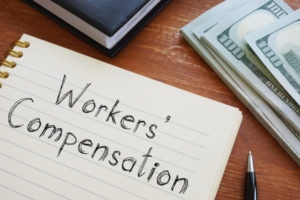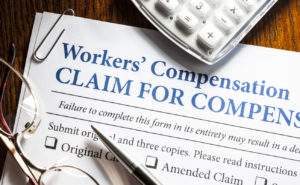
Being injured on the job may result in severe injuries that keep you out of work. Fortunately, most work-related injuries in Florida are covered by workers’ compensation. Therefore, you may be entitled to wage replacement benefits if you are out of work because of an eligible work-related injury or illness.
Table of Contents
Wage Replacement Benefits for Workplace Injuries

Most injured workers may receive weekly cash payments while recovering from an injury sustained on the job. The amount of the wage replacement benefits is set by law. Most workers can receive about 66 2/3 percent of their average weekly wages as benefits.
There are four basic types of wage replacement benefits available for a workers’ compensation claim:
Temporary Total Disability
If you cannot work because of your injury or illness, you can receive 66 2/3 percent of your average weekly wages while you are recuperating.
However, there are a few essential things to know about temporary total disability or TTD benefits:
- They are subject to a statewide maximum weekly amount. For injuries occurring in 2021, the maximum weekly compensation rate is $1,011.
- You must be unable to work for at least eight days before you can begin receiving benefits.
- You will not receive wage benefits for the first seven days of disability unless you are out of work for more than 21 days.
- Some severe injuries may qualify you to receive 80 percent of regular wages for up to six months after the date of injury.
Temporary total disability benefits are available for a total of 104 weeks.
Temporary Partial Disability
Temporary partial disability benefits or TPD are paid to workers who may return to work with restrictions. For example, you cannot pick up anything weighing more than 20 pounds, or you must work at a desk job instead of in the field.
You can earn 80 percent of regular wages as TPD benefits. The same maximum benefits total for TTD benefits applies to TPD benefits. You may also receive temporary partial disability benefits for up to 104 weeks after your accident.
Permanent Total Disability
PTD benefits apply when you are unable to work again because of a work-related illness or injury. A physician must find that you are permanently disabled after you reach Maximum Medical Improvement.
You must also demonstrate that you cannot engage in any type of employment within 50 miles of your home because of your work-related injury or illness. If you are in a large city or have skills that could easily transition to a doctor-recommended job, this requirement can be challenging to meet.
Permanent total disability payments are payable through age 75. You may also receive a small cost of living increase each year until you reach 62.
Impairment Income Benefits (IIB)
You might be entitled to impairment income benefits if your physician indicates your condition is not expected to improve significantly once you reach Maximum Medical Improvement.
The amount and duration of benefits you receive for IIB are based on your impairment rating and work restrictions. IIB also has maximum benefit amounts.
How Can You Receive Compensation Pay for Lost Wages After a Work Accident?

It is crucial that you take the correct steps after a work accident or injury to receive your wage replacement benefits.
Steps to take after a work injury or accident include:
- Notify your employer immediately. Under Florida law, you have 30 days to notify your employer of a workplace injury. In an emergency, you may seek immediate medical treatment for your injuries.
- See a doctor as soon as you discover a work-related illness or injury. You need to mitigate damages by seeking prompt medical care. Also, you need a doctor’s written report to receive your workers’ compensation benefits.
- Follow your doctor’s treatment plan. If your doctor gives you restrictions, follow those restrictions at home and work. Do not do anything that the workers’ comp insurance provider could use to deny your claim.
- Be sure to tell the medical provider that you were injured on the job and how you were injured. B providing details about the accident and your injury, the doctor can create a thorough report to avoid problems that delay your benefits.
- Your employer must file a notice of your claim with the workers’ compensation insurance provider within seven days after being notified of an accident. You should receive additional information about your claim and benefits within a week after the claim is filed.
Should I Hire a Workers’ Compensation Lawyer?

You might want to consult with a Florida workers’ compensation lawyer to review your case and the benefits you should receive.
It may be necessary to hire a lawyer if:
- Your employer refuses to file a workers’ comp claim
- The insurance company or your employer denies your workers’ comp claim
- You do not receive the benefits you are entitled to receive
- Your wage replacement benefits are not calculated correctly, and the insurance company refuses to correct the amount
- You sustained a traumatic injury or permanent impairment, or disability
- Your doctor recommends a treatment that your employer or the insurance company refuse to approve
- You have a pre-existing condition or a prior injury
- Your employer retaliates against you for filing a workers’ compensation claim
You have the right to consult with a workers’ compensation attorney about your claim. Seek legal advice from an attorney to protect your claim.
Third-Party Claims Seeking Compensation for Wages

Workers’ compensation does not reimburse you for all lost wages. However, if a third party caused your injury or illness, you could seek compensation for all lost wages.
You could also receive compensation for other damages not covered by workers’ compensation by filing a third-party claim. Third parties that could be liable for a work injury include other drivers, property owners, manufacturers, and other companies working on the property.
Damages that you could recover from a third party claim include:
- Reimbursement for all lost wages
- Reimbursement for any medical bills not covered by workers’ compensation
- Pain and suffering damages
- Cost of personal care and long-term nursing care
- An increased amount for permanent disability, impairments, scaring, and disfigurement
- Loss of enjoyment of life and reduced quality of life
- Other out-of-pocket expenses not covered by workers’ compensation
The value of a third-party claim depends on the facts of your case. In most cases, employees cannot sue their employers for a work injury or illness covered by workers’ compensation.
However, if your employer was grossly negligent or intentionally caused your injury, you could have a claim against your employer.
A Florida workplace accident attorney can review your case to determine your options for seeking compensation and benefits for a work accident or injury.
Contact Our Florida Workers’ Compensation Lawyers for a Free Consultation
At, Perenich, Caulfield, Avril & Noyes Personal Injury Lawyers, we understand that you might have questions about all workers’ compensation benefits. If you have never been hurt on the job, it is common to have questions and concerns about what happens next.
For more information, please contact the Clearwater and St. Petersburg workers’ compensation law firm of Perenich, Caulfield, Avril & Noyes Personal Injury Lawyers at the nearest location to schedule a free consultation today. We will answer your questions about workers’ comp claims and offer legal advice to help you receive all of the benefits you are entitled to.
We serve in Pinellas County, and its surrounding areas:
Perenich, Caulfield, Avril & Noyes Personal Injury Lawyers – Clearwater
1875 N Belcher Rd. STE 201,
Clearwater, FL 33765
727-796-8282
Perenich, Caulfield, Avril & Noyes Personal Injury Lawyers – St. Petersburg
2560 1st Ave S,
St. Petersburg, FL 33712
(727) 349-1728
Related Workers’ Compensation Articles
- Can You Go On Vacation While On Workers’ Compensation?
- Workers’ Compensation FAQs
- Can You Be Fired After a Workers’ Compensation Injury in Florida?
- Important Questions to Ask Your Florida Workers’ Compensation Lawyer
- Steps to Filing a Workers’ Compensation Claim
- Suing A Third-Party for a Workplace Accident: What Kinds of Third Parties May Be Involved